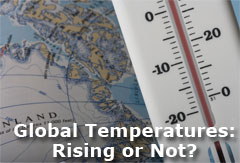We have no dog in the global warming/no global warming hunt, but try to present both sides objectively and fairly report when new information emerges.
While many areas of sustainable supply chains, such as improved fuel, water and packaging efficiency, can be separated from carbon emissions and global warming as a result of their own cost savings potential, reducing CO2 emissions remains at the heart of most corporate green supply chain strategies. They are obviously at the core of cap and trade and other proposed strategies to reduce greenhouse gas emissions.
But what has happened to global temperatures over the past decade?
"The answer is: almost nothing for more than 10 years," says William Happer, a professor of physics at Princeton University, in a column this week in the Wall Street Journal. "The latest (February 2012) monthly global temperature anomaly for the lower atmosphere was minus 0.12 degrees Celsius, slightly less than the average since the satellite record of temperatures began in 1979."
Happer adds that "The lack of any statistically significant warming for over a decade has made it more difficult for the United Nations Intergovernmental Panel on Climate Change (IPCC) and its supporters to demonize the atmospheric gas CO2 which is released when fossil fuels are burned."
Interestingly, Happer says that CO2 is simply not a pollutant.
"Life on earth flourished for hundreds of millions of years at much higher CO2 levels than we see today," Happer says. "Increasing CO2 levels will be a net benefit because cultivated plants grow better and are more resistant to drought at higher CO2 levels, and because warming and other supposedly harmful effects of CO2 have been greatly exaggerated."
 Happer says that his calculations of the direct warming effect due to a doubling of CO2 levels in the atmosphere should cause a warming of about one degree Celsius. The IPCC computer models predict a much larger warming, three degrees Celsius or even more, because they assume changes in water vapor or clouds that supposedly amplify the direct warming from CO2. Many lines of observational evidence suggest that this "positive feedback" also has been greatly exaggerated. Happer says that his calculations of the direct warming effect due to a doubling of CO2 levels in the atmosphere should cause a warming of about one degree Celsius. The IPCC computer models predict a much larger warming, three degrees Celsius or even more, because they assume changes in water vapor or clouds that supposedly amplify the direct warming from CO2. Many lines of observational evidence suggest that this "positive feedback" also has been greatly exaggerated.
Contrary to what most people believe give news reports in recent years, Happer says that since the end of the so-called Little Ice Age in the early 1800s, the level of global warming has been slight, about 0.8 degrees Celsius.
"Some of that warming has probably come from increased amounts of CO2, but the timing of the warming—much of it before CO2 levels had increased appreciably—suggests that a substantial fraction of the warming is from natural causes that have nothing to do with mankind," Happer says.
Happer says IPPC and its supporters are frustrated by the lack of computer-predicted warming over the past decade, and have now turned to claims that that "extreme weather" has become more common because of more CO2, even if temperatures aren't rising.
But he disputes that too, and says people too often look at just their own region relative to whether and not on a global basis. For example, there was an unusually cold winter in 2011 (December 2010-February 2011) in much of the US, followed by a very mild one in 2012 in the continental United States. But conditions were bitter Europe, Asia and Alaska at the same time.
Similarly, while the recent devastating tornadoes in the Midwest and some other parts of the country has led people to wonder if global warming was the cause. No again, says Hopper, quoting a recent article from Andrew Revkin in the New York Times, who wrote that "There is no evidence of any trend in the number of potent tornadoes (category F2 and up) over the past 50 years in the United States, even as global temperatures have risen markedly."
It is easy to be confused about climate, because we are constantly being warned about the horrible things that will happen or are already happening as a result of mankind's use of fossil fuels," Happer concludes. "But these ominous predictions are based on computer models. It is important to distinguish between what the climate is actually doing and what computer models predict. The observed response of the climate to more CO2 is not in good agreement with model predictions."
What do you think of Happer's observations and conclusions? Should we look at the carbon emissions issue with fresh eyes? Let us know your thoughts at the Feedback button below.

TheGreenSupplyChain.com is now Twittering! Follow us at www.twitter.com/greenscm |